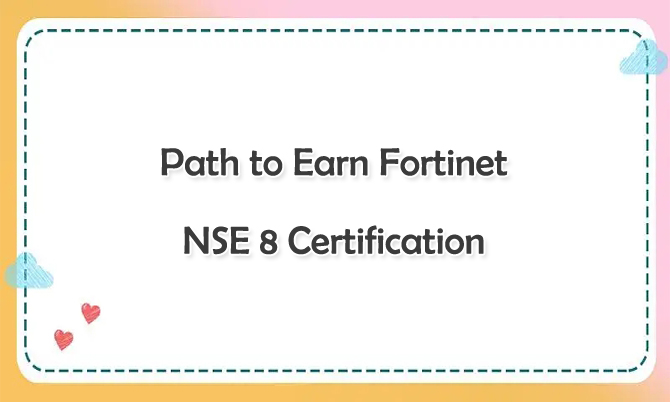Fortinet NSE 8 certification is the highest level of certification offered by Fortinet, a global leader in cybersecurity solutions. It is designed for experienced professionals who possess in-depth knowledge and expertise in designing, implementing, managing, and troubleshooting complex Fortinet security solutions. If you are one of them, you can choose to earn Fortinet NSE 8 certification. The following Fortinet NSE 8 certification information is valuable in your path to get certified.

Fortinet NSE 8 Written Exam - NSE8_812
The written exam NSE8_812 for the NSE 8 certification is accessible globally and can be taken at Pearson VUE test centers. Once you pass the written exam, you can proceed with scheduling the practical exam. The practical exam is conducted online and supervised by ProctorU. The written NSE8_812 exam comprises questions that evaluate your understanding of design scenarios, configuration extracts, and troubleshooting scenarios related to security networking and Fortinet solutions. It is important to note that you are prohibited from bringing any reference materials into the exam room.
Number of questions: 60
Time allowed to complete: 120 minutes
Scoring method: You will receive a document containing a pass or fail result and an indication of your performance for each exam section.
Type of questions: Multiple choice and multiple select
Time required between exam retakes: 15 days
Fortinet NSE 8 Practical Exam - NSE8_870
The NSE8_870 practical exam is an online examination that is supervised by ProctorU. It is conducted over the course of one day, consisting of two sessions. The practical exam assesses your skills through hands-on activities. During this exam, you will be required to configure and validate a comprehensive network topology that incorporates multiple Fortinet products.
Available at: Fortinet Training Institute, proctored through ProctorU
Number of tasks: 30 (15 unique tasks per session)
Time allowed to complete: 1 day, 2 sessions (5 hours and 4 hours), proctored
Type of tasks: Hands-on configuration and troubleshooting
Time required between attempts: 15 days
Fortinet NSE 8 Certification Covered Topics
The Fortinet NSE 8 Certification covers a range of topics related to network security and Fortinet solutions.
1.Network Security Design: This topic focuses on designing secure network architectures, including network segmentation, high availability, and scalability considerations.
2.Advanced Threat Protection: It covers advanced threat detection and prevention techniques, such as sandboxing, threat intelligence, and integration with security information and event management (SIEM) systems.
3.Secure Access: This topic delves into secure access technologies, including authentication, authorization, and accounting (AAA), secure remote access (VPN), and identity-based policies.
4.Secure SD-WAN: It covers the integration of security services with software-defined wide area network (SD-WAN) solutions, including traffic optimization, path selection, and secure connectivity.
5.Cloud Security: This topic focuses on securing cloud environments, including public, private, and hybrid cloud architectures, cloud-native security, and integration with cloud service providers.
6.Security Operations and Analytics: It covers security operations center (SOC) processes, security event monitoring, log analysis, and security incident response.
7.Fortinet Products and Solutions: This includes in-depth knowledge of Fortinet's product portfolio, such as FortiGate firewalls, FortiManager, FortiAnalyzer, FortiSandbox, and other Fortinet security solutions.
Fortinet NSE 8 Certification Value
To earn Fortinet NSE 8 certification, you need to pass both written exam and practical exam. The NSE 8 certification demonstrates a high level of expertise in designing, implementing, and managing complex network security solutions using Fortinet products. It signifies that you possess advanced skills and knowledge in the field of cybersecurity. Holding the NSE 8 certification can open up new career opportunities and enhance your professional growth. It can make you stand out among your peers and increase your chances of securing senior-level positions, such as network security architect, consultant, or engineer.
